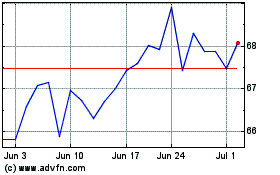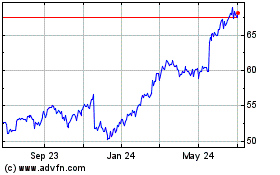By Corinne Abrams
MUMBAI -- Thousands of products were pulled from Amazon.com
Inc.'s India website Friday -- the first direct impact from the
country's new e-commerce rules, a day after warning the
restrictions would hurt its business there.
India's new restrictions, which went into effect Friday, were
designed to help local retailers better compete against
foreign-owned giants like Amazon and Walmart Inc., as the
e-commerce market is poised to boom in the country. Amazon warned
Thursday that India's restrictions could crimp revenue this quarter
and that it was still evaluating the regulations.
"We do believe that India remains a good long-term opportunity,"
Amazon's financial chief Brian Olsavsky said.
In India, rules had barred foreign companies from holding their
own online inventory and selling it direct to customers. Amazon
previously worked around those regulations by selling products
through subsidiaries of companies in which it owned stakes.
India tightened restrictions in late December by saying foreign
retailers weren't allowed to sell online through such companies and
barring foreign companies from entering into exclusive online sales
agreements. Companies had until Feb. 1 to comply after their
requests for more time was denied.
On Friday, thousands of products were removed from Amazon's
India website. On Amazon's India website, the Amazon Echo and some
other Amazon-made products were temporarily unavailable Friday
morning before the company scrambled to get other sellers to offer
them. Products from companies partly owned by Amazon subsidiaries
also weren't available, as well as those from other Amazon in-house
brands, according to Bangalore-based RedSeer Management
Consulting.
An Amazon spokeswoman said the company was working to make all
Amazon exclusive brands available again on the website.
Both Amazon and Walmart have made big bets in India, where the
e-commerce market is estimated to balloon to $72 billion in 2022
from around $33 billion in 2018, according to research firm
eMarketer. Amazon has pledged to invest $5 billion to expand in the
world's fastest growing large economy, while Walmart's takeover of
India's Flipkart for $16 billion was its biggest acquisition
ever.
The new e-commerce rules are the latest effort by India to try
to restrict U.S. tech giants' dominance in the country and promote
homegrown companies in a year when Prime Minister Narendra Modi is
seeking to win a second term in a general election. The government
plans to introduce a "national champion" policy to encourage the
rise of Indian companies, according to a person familiar with the
matter.
Analysts said the new rules could affect as much as 40% of
Amazon's sales in India and around a third of the revenue at
Flipkart, the homegrown online retail leader now controlled by
Walmart. The two companies have been neck-and-neck in terms of
revenue: Flipkart's revenue for the financial year ended March 31,
2017, was $3.8 billion, while Amazon's was $3.2 billion in India,
according to estimates from Barclays Research.
Both Amazon and Walmart, long among the biggest bulls on the
India opportunity, were shocked when New Delhi unveiled the new set
of regulations and clarifications late last year aimed at foreign
owned e-commerce companies that seriously affect how they were
doing business.
"It's very challenging," for the companies, said Satish Meena, a
senior forecast analyst at Forrester Research. "They have to work
out what to do with this inventory," and rethink their business
models, he said.
Tech companies face other challenges as well. Facebook Inc.'s
WhatsApp meanwhile is under pressure to allow authorities to read
the messages of its users in India and is waiting for approval to
roll out its first mobile-payments feature beyond the test
phase.
The new rules also state that one vendor can't make more that
25% of its sales on one marketplace.
The 25% rule will likely affect Flipkart, which sells "private"
brands or lines made only for Flipkart through its website, said
Mr. Meena. Items from the Divastri brand, which Flipkart called a
"private label" on its blog, were still available online Friday.
Flipkart sells around a third of its products through private
labels, according to research firm Technopak Advisors. Flipkart
needs to rethink that model, said Ankur Bisen, a senior vice
president at Technopak.
A spokesman for Flipkart said the company was working to change
its supply chains and systems to comply with the regulations.
"We are disappointed that the government has decided to
implement the regulation changes at such haste," said the
spokesman.
Walmart's bricks- and-mortar wholesale stores won't be affected
by the changes. It runs 23 Best Price stores and two fulfillment
centers in India.
The restrictions may create some breathing space for smaller,
Indian-owned rivals like Snapdeal.com, as well as Reliance
Industries Ltd., a company backed by India's richest man, Mukesh
Ambani, that said in January it would ramp up e-commerce
efforts.
They could also give other foreign companies pause before
deciding to invest heavily in India.
"They will not make big bets like Walmart," based on the
regulation changes, said Forrester Research's Mr. Meena. "If there
is no consistency in policy that is more damaging for companies
coming into the market."
--Newley Purnell in New Delhi contributed to this article.
Write to Corinne Abrams at corinne.abrams@wsj.com
(END) Dow Jones Newswires
February 01, 2019 13:53 ET (18:53 GMT)
Copyright (c) 2019 Dow Jones & Company, Inc.
Walmart (NYSE:WMT)
Historical Stock Chart
From Mar 2024 to Apr 2024

Walmart (NYSE:WMT)
Historical Stock Chart
From Apr 2023 to Apr 2024
